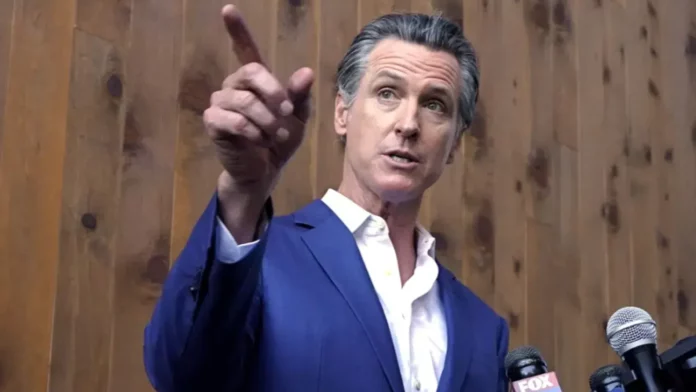
INSIDE THIS STORY
🛑 A Governor’s Shield: Newsom’s pardon of a convicted gang member may signal broader efforts to block ICE deportations.
📜 Past Crimes, Present Protections: Bin’s violent history is now being legally wiped clean—just in time to halt or impede his removal from the U.S.
⚠️ State Power vs. Federal Enforcement: Newsom’s move raises questions about the limits of gubernatorial clemency in immigration cases.
By Samuel Lopez – USA Herald
SACRAMENTO – California Governor Gavin Newsom has granted a controversial Easter pardon to Sithy Bin, a Cambodian immigrant and former gang member convicted of a violent crime, in a move that could allow him to avoid deportation and remain in the United States—despite a serious felony record.
Bin, once a member of the “Crips with Attitude” gang in Long Beach, was sentenced to 40 years to life in prison following a 2008 conviction for opening fire at the home of a rival gang member during a neighborhood barbecue. A bystander was injured in the shooting, and Bin was prosecuted and convicted in Stanislaus County.
Despite the seriousness of the crime, Newsom’s office framed the pardon as an acknowledgment of Bin’s post-conviction transformation. In a public statement, the governor wrote:
“While in prison, Mr. Bin was never disciplined for misconduct. He engaged in extensive self-help programming, maintained an excellent work history, and received numerous commendations for his positive transformation.”
But the pardon has prompted criticism and concern, particularly because it appears aimed at undermining federal immigration enforcement. Bin, now 50, was released from state custody during the COVID-19 pandemic. His good behavior and work to rehabilitate himself and support other felons led to a reduced sentence.
Upon his release he was immediately transferred to Immigration and Customs Enforcement (ICE). He was detained at the Mesa Verde ICE facility but later released due to overcrowding and unsafe conditions.
In March of this year, Bin was given 60 days to self-deport to Cambodia—a country he fled as a toddler and has no connection to as an adult. The governor’s pardon now provides Bin with a powerful legal argument to halt that deportation, essentially erasing the state-level conviction that triggered ICE’s action.
The pardon is being interpreted by some legal analysts and immigration attorneys as a calculated step in what could become a larger strategy by Newsom to use his clemency powers to undercut ICE removals based on old criminal convictions.
“This may be the first domino in a wider policy shift. By granting pardons to select immigrants with serious past convictions who have pending deportation orders, the state could give them a temporary legal shield against ICE—even if their crimes would otherwise qualify for removal under federal law.” – Samuel Lopez, Legal Analyst
Bin’s supporters submitted dozens of letters urging Newsom to intervene. They argued that Bin’s commitment to rehabilitation, his work as a prison minister, and the decades he has spent in the U.S. should outweigh the conviction that nearly cost him his freedom, and nearly took the life of his victim—and now, his right to remain in the country hangs in the balance.
Critics, however, argue that the pardon ignores the severity of his past conduct and sends a dangerous signal that violent crimes can be retroactively erased when politically expedient.
The implications of Bin’s pardon go beyond his personal case. Under federal law (8 U.S.C. § 1227(a)(2)(A)), certain crimes—especially those deemed “aggravated felonies”—automatically trigger deportation proceedings. However, a full and unconditional pardon from a state governor can, in some instances, erase the underlying criminal basis for removal.
That’s precisely what Newsom’s pardon aims to do.
By removing Bin’s conviction from his record, California is effectively cutting off one of ICE’s primary legal avenues to deport him. While the federal government may still attempt removal under different grounds, Newsom’s action severely complicates that process.
The move places Newsom once again at odds with federal immigration officials and reopens the debate over whether state-level clemency should have immigration consequences. Newsom has previously criticized heightened deportation policies and ICE’s sweeping tactics, particularly under the Trump administration.


